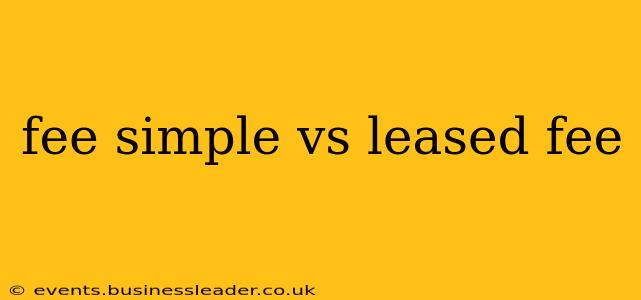Understanding the nuances of real estate ownership is crucial for both investors and property owners. Two fundamental concepts often causing confusion are fee simple and leased fee interests. This article will clarify the distinctions between these ownership types, answering common questions and providing a comprehensive overview.
What is Fee Simple Ownership?
Fee simple, often referred to as fee simple absolute, represents the highest form of ownership in real estate. It grants the owner complete control and rights to the property, including the right to possess, use, enjoy, and dispose of it as they see fit (subject to zoning laws and other regulations, of course). This ownership is essentially unrestricted and inheritable, passing down to heirs upon the owner's death unless specified otherwise in a will. Think of it as outright ownership—you own the land and everything on it.
Key Characteristics of Fee Simple:
- Unrestricted Ownership: The owner has virtually unlimited rights to the property.
- Inheritable: The ownership can be passed down through generations.
- Indefinite Duration: The ownership lasts indefinitely unless the owner chooses to sell or transfer it.
- Full Bundle of Rights: The owner possesses all the rights associated with property ownership.
What is Leased Fee Ownership?
Leased fee ownership, on the other hand, represents the ownership of the property subject to a lease. The owner, in this case, retains ownership of the land but relinquishes the right to possess and use it for a specific period to a tenant. The owner receives rental income in exchange for granting the lease. Essentially, the leased fee owner owns the underlying land, but the tenant holds the right to use and occupy it.
Key Characteristics of Leased Fee:
- Ownership Subject to a Lease: The owner's rights are limited by the terms of the lease agreement.
- Rental Income: The owner receives income from the lease.
- Limited Possession: The owner does not have the right to possess or use the property during the lease term.
- Potential for Appreciation: The owner still benefits from any appreciation in the property's value.
What are the Differences Between Fee Simple and Leased Fee?
The core difference boils down to possession and control. In fee simple, the owner has complete control. In a leased fee, the owner retains ownership but gives up possession and control for the duration of the lease. This table summarizes the key distinctions:
| Feature | Fee Simple | Leased Fee |
|---|---|---|
| Ownership | Complete and unrestricted | Ownership subject to a lease |
| Possession | Full possession and control | No possession during the lease term |
| Income | No guaranteed income from property itself | Rental income from the lease |
| Duration | Indefinite | Limited by the lease term |
| Transferability | Freely transferable | Transferability is impacted by the lease |
What is the Value of a Leased Fee Interest?
The value of a leased fee interest is determined by several factors:
- Remaining Lease Term: A longer lease term generally commands a higher value.
- Rental Rate: Higher rental rates lead to a higher value.
- Creditworthiness of the Tenant: A financially stable tenant increases the value.
- Property's Market Value: The underlying property's value directly impacts the leased fee's worth.
- Escalation Clauses: Clauses allowing for rent increases over time improve the investment's appeal.
What are the Tax Implications of Fee Simple vs. Leased Fee?
Both fee simple and leased fee interests are subject to property taxes. However, the tax burden may be different. In a leased fee, the tax liability often depends on the terms of the lease—who is responsible for paying property taxes may be stipulated within the agreement. This should be explicitly clarified in the lease documentation. Consulting a tax professional is highly recommended for personalized advice.
Is Leased Fee a Good Investment?
Whether a leased fee is a good investment depends entirely on the specifics of the lease, the property's location and market conditions, and the investor's risk tolerance. It can provide a stable income stream, but it also carries risks associated with tenant default or lease expiration. Careful due diligence is essential before investing in a leased fee interest.
This comprehensive overview should provide a clear understanding of the differences between fee simple and leased fee interests in real estate. Remember to always consult with real estate professionals and legal counsel for specific advice tailored to your situation.
